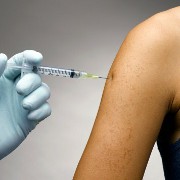 Photo: Getty Images
Photo: Getty Images
The human papillomavirus (HPV) is an infection spread through sexual contact. It can cause cervical cancer and genital warts. More than 50 percent of sexually active men and women will have HPV at some point in their lives. Approximately 20 million people in the U.S. are infected with the HPV virus. Many are not even aware they have it as it typically goes away on its own.
Two vaccines are now available to protect girls and women against the four major types of HPV that cause cervical cancer and genital warts. These vaccines, Gardasil and Cervarix, are expected to be long-lasting and highly effective against the disease. The HPV vaccine is recommended by the Centers for Disease Control, the U.S. Food and Drug Administration, the National Institutes of Health and many doctors.
The vaccine is a series of shots injected into a muscle in the arm or thigh. It is administered in a three-dose series, with the second and third doses given two months and six months after the first, respectively. It is very important that patients receive the full cycle or the injections may not provide full protection against HPV.
It is recommended for girls aged 11-12 but can be given to those as young as nine years of age. Ideally the vaccine is given to girls before they become sexually active and exposed to the HPV virus. The vaccine is also recommended for girls and women ages 13-26.
People with yeast allergies or allergies to any other component of the HPV vaccine should not receive it. Pregnant women are also advised against getting the vaccine until further studies can prove it is safe for both mother and fetus. The HPV vaccine cannot protect against an infection that is present at the time of the vaccination.
There can be serious side effects from unknown allergic reactions. Some people get hives and others experience swelling in the face, mouth, and throat.
The average cost for the full cycle of the vaccine is around $375.00. Some insurance companies pay for the injections but it can be an out-of-pocket expense. The CDC has a program that helps children under 18 to receive the vaccination for free.
There are several different strains of HPV, so the HPV vaccine does not protect against all cases of the infection and disease. Therefore experts recommend getting regular Pap smear screenings and practicing safe sex even after vaccination.
Sources:
CDC.gov
FDA.gov
WebMD.com
Gardasil.com
Suite101.com





Add a CommentComments
There are no comments yet. Be the first one and get the conversation started!